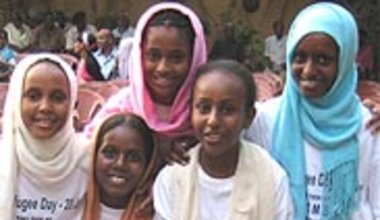A long refugee history
Under the theme "home", the agency celebrated World Refugee Day with a youth art and games day as well as an evening celebration for refugees at Rashid Diab Centre on 20 June (the actual day). On 16 June, it held a football game between refugee teams at the Saha Shabia Club.
During the evening event on 20 June, which featured refugee crafts, food and music as well as speeches by distinguished guests, UNHCR Representative in Sudan Peter de Clercq observed that Sudan had a long history of hosting refugees.
"The partnership between UNHCR and the government and people of Sudan goes back to the 1960s, when the first officially recognized refugees entered eastern Sudan, creating what is now the longest standing refugee situation in the world," the UNHCR official said.
Mr. de Clercq noted that an estimated 200,000 refugees were currently residing in the country --100,000 in eastern Sudan, 30,000 in Khartoum, 40,000 in Darfur and more than 25,000 in Southern Sudan.
"(Some) 60% of the refugees in the east were born in Sudan," he said. "They are now in the second and third generations. We are working closely with the government to find durable solutions for this population."
At the football game and arts and crafts day, some youths were asked about "refugees", and what "home" meant to them. Here are some of their responses.
Football game at Saha Shabia Club
 |
Benjamin, the 17-year-old son of Congolese refugees, was born in Khartoum. Stating that he "felt Sudanese", Benjamin said he was happy to have a home where he has family, can sleep, and has good food and clothes. His biggest pleasure was playing football with other youths, no matter where they came from. |
| Mohamed, 13, comes from Dongola, but grew up in Khartoum. He was watching the football game between refugee youths, but was unaware of the players' origins and did not understand they were refugees. He said he enjoyed football and other sports. For him, home meant family. |
 |
Emmanuelle was born in Democratic Republic of the Congo and is 19 years old. He plays football with other youths from Sudan and elsewhere daily in Amarat. Emmanuelle said he felt comfortable in Sudan. Home for him is "what keeps you in one place - you feel you have to be there ... it is the street you live on". |
World Refugee Day
Refugee girls at Rashid Diab Centre

Seghen was born in Port Sudan of Eritrean parents, but has lived in Khartoum most of her life. The 12-year-old girl does not know why her parents left their homeland. Stating that she felt the same as Sudanese girls, she said home meant "family and peace", which is what she has known in Khartoum.
 UN
UN United Nations Peacekeeping
United Nations Peacekeeping







